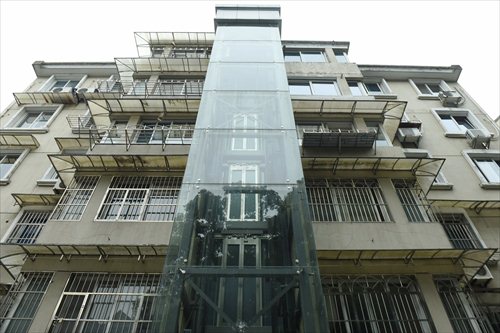HOME >> CHINA
Facial recognition in elevators provokes privacy concerns
By Ji Yuqiao and Zhang Hui Source:Global Times Published: 2019/9/19 20:38:42

An elevator installed outside an apartment building in Hangzhou, East China's Zhejiang Province. Photo: CFP
Shanghai's residential compounds have been installing smart elevators with facial recognition technology to warn of possible safety risks of elevators and help rescue trapped residents. But the new technology has also triggered some people's concern about abuse of residents' privacy.
Facial recognition and real-time monitoring connect the elevators to police for "solving crimes and locating suspects and for rescue teams to pacify and instruct trapped residents," a Shanghai Elevator Trade Association representative who requested anonymity told the Global Times on Thursday.
Shanghai will install 50,000 smart elevators in communities and subways by the end of this year, the official said.
All the city's 2.7 million elevators will be replaced with smart elevators in the future, he said.
The smart elevators collect real-time information and send statistics to a unified platform for maintenance and rescue, the official explained, and sensors could immediately detect breakdowns and warn of possible safety risks.
Artificially intelligent elevators have been installed in many cities including Quanzhou in East China's Fujian Province, Tianjin Municipality and Nanning in South China's Guangxi Zhuang Autonomous Region.
According to the Guangxi capital-based Nanning Evening News, smart elevators automatically report malfunctions and "improper behaviors" of residents that include fighting or carrying banned articles. Through smart information, the building's management authorities could take immediate action, the newspaper said.
But some Shanghai residents expressed fears that their daily schedule and other private information gathered by real-time monitoring and facial recognition might be leaked for illegal usage.
"So now whichever department is responsible for managing statistics can know exactly when I go to work, return home, walk my dog, pick up my mail, have friends visit," one internet user posted on China's Twitter-like Sina Weibo.
Another internet user echoed that while it was good to protect safety, "it's also true about possible privacy leakage. The government better come up with regulations to properly manage the AI industry and its applications."
Privacy controversies emerged in August about AI in schools for monitoring students and face-changing applications.
A guide to AI safety and the rule of law was published at the 2019 World Artificial Intelligence Conference in Shanghai in August, Shanghai news portal thepaper.cn reported.
Suggestions included strengthening legislation and enforcement of the safety of statistics, strengthened supervision of companies and industries collecting and using sensitive personal data.
The guide is represented a "positive response" by the AI industry to social appeal and also a deep reflection on the safety of AI development, according to a commentary published in the People's Daily.
Only by "injecting safety genes into AI technology" could a safe, reliable and controllable development of AI technology be achieved, the article said.
Posted in: SOCIETY